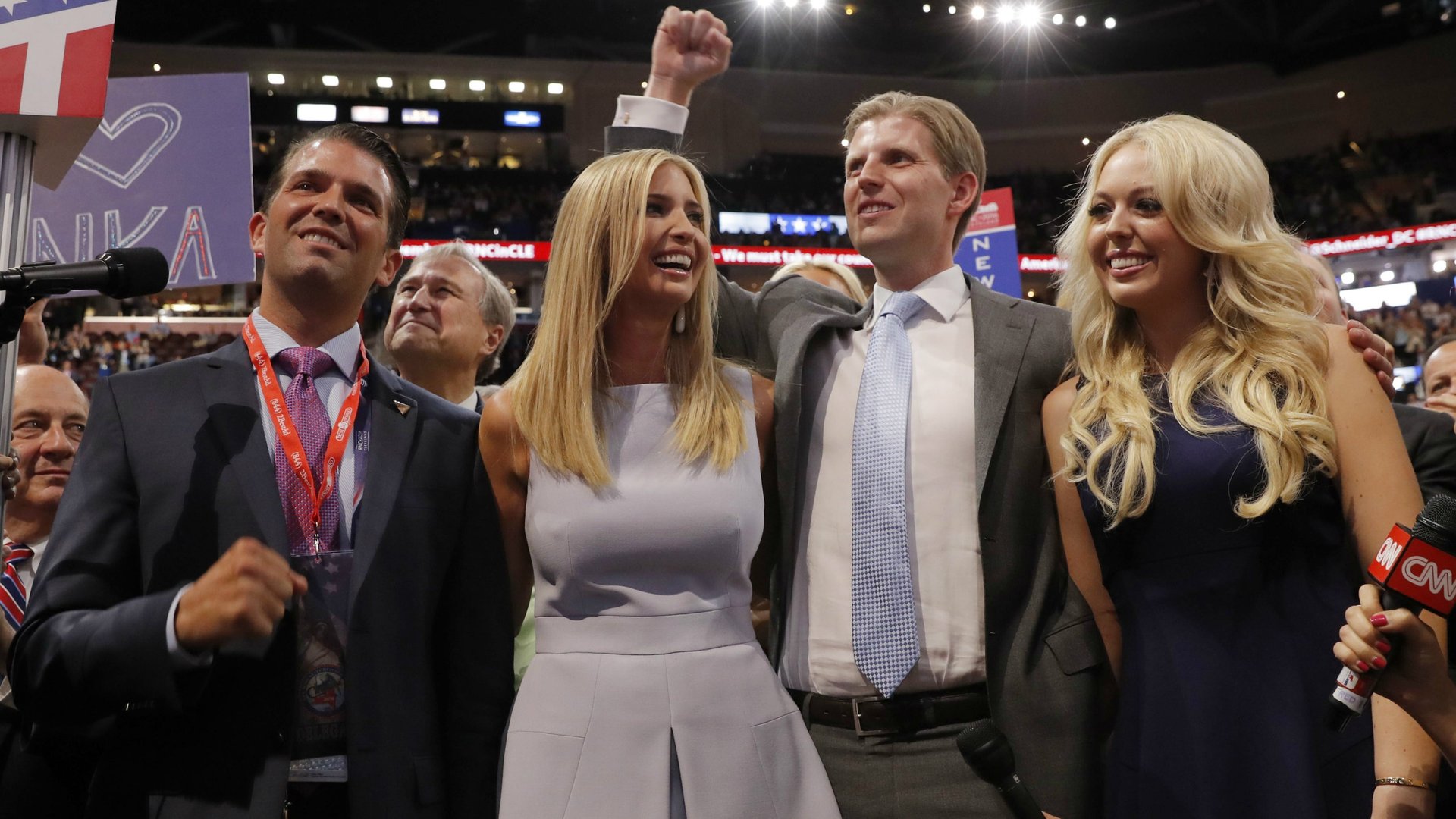The RNC is a shambles because the Trump kids are the only team Donald can trust
Cleveland, Ohio


Cleveland, Ohio
Weeks before the convention, when things were looking shaky, Trump said he didn’t need the Republican Party to pull off the event. And he’s right; he didn’t. Even though the Republican establishment fell in behind him, Trump’s adult children have supplanted the lions of the party in defining its brand and agenda in a crucial election year.
Obviously, lots of prominent Republicans declined to speak, which maybe made it hard to fill primetime speaking slots. But it’s still unprecedented. Sure, it’s not strange for a candidate’s children to vouch for him—as, say, Craig Romney did in 2012. But Craig was one of Mitt Romney’s five adult children, and spoke for not quite three minutes. All but one of Trump’s children had prime-time convention speaking slots, and were allotted plenty of time, too. Eric’s speech clocked in at around 14 minutes, while Donald Jr. held forth for nearly 17 minutes—longer than speeches by Chris Christie and Newt Gingrich, the most prominent politicians in Trump’s fanbase.
This isn’t a Republican party convention. It’s part-family reunion toasting session, part-Trump Organization board meeting, part-The Apprentice. What on earth does the campaign—to say nothing of the Republican leaders—think the Trump kids can achieve that actual Republicans with actual political experience can’t?
This choice seems especially at odds with Trump’s own claim to superior managerial knack. Throughout the campaign, one of his most common refrains is that he should be president because he “picks the best people.” The best people to negotiate trade deals. The best generals to beat ISIS. The best justices to sit on the Supreme Court. This isn’t just a throwaway phrase; it’s the bedrock of his proposition. The American people can vote for him without having to sweat the details of his plans and his politics because they know Trump will get the talent. Winners, after all, hire winners.
So what does it mean that the “best” people to manage his business empire, his campaign, and, now, the Republican Party’s quadrennial showcase of its blueprint for America just happen to be his own offspring?
Clearly, Donald Trump’s definition of “the best” means something very different from the commonly accepted one. While some point to the wealth, polish, educational pedigree, celebrity, and influence of his three eldest children as signs of their competence, all of that comes thanks to Trump Sr.’s largesse (with the possible exception of Ivanka’s entrepreneurial knack).
Not exactly the picture of upward mobility and meritocracy that Trump has promised the American people. Strangely, though, many delegates who didn’t come to the convention being Trump fans seem to find his children to be compelling testimonies to Trump’s qualification for the presidency. There are, of course, many who don’t. But by and large, the delegates we’ve spoken with find the endorsements of Trump’s progeny softening their skepticism of the Donald.
What is it about their presence that is so compelling? Feedback tends to be vague—that they make him seems more human, that he’s a successful parent. Some are simply touched that they’re doing him proud. This was perhaps best articulated by Ralph Reed. Though Trump’s multiple marriages and questionable Christian values once made him question the tycoon’s character, he eventually came around. Why?
“Number one, I know his children,” Reed told NPR. “And you don’t raise children who are this phenomenal if you’re a person of bad moral character.” Of course, it should be well known that Trump barely raised them at all, or that the most paternal guidance he seemed to give them as children as “no drugs, no alcohol, no cigarettes.” As with so much else in this campaign, fact is weaker than myth.
They join his company soon after college. They drop everything—including, for some of them, their Democratic Party leanings—and help their father campaign. This unquestioning deference to paterfamilias is exactly the role they have been performing in their speaking slots at the convention. And preference for obedient, well mannered, and well behaved children—what pollsters call authoritarianism—happens to be a defining quality of Trump supporters, according to political scientist Matthew MacWilliams. It’s also far more prevalent among Republicans than Democrats.
In this light, there is a certain kind of accomplishment that Trump’s children exemplify. There is something they genuinely are the “best” at: filial duty. They are clearly not master politicians or convention organizers, but they are doing their best for dear old dad under unprecedented circumstances.
They’re not just mascots of Trump’s wealth and celebrity. They’re above all extensions of their father’s will. It’s worked out so well for them, as they keep arguing at the convention, that the American people should try it too.